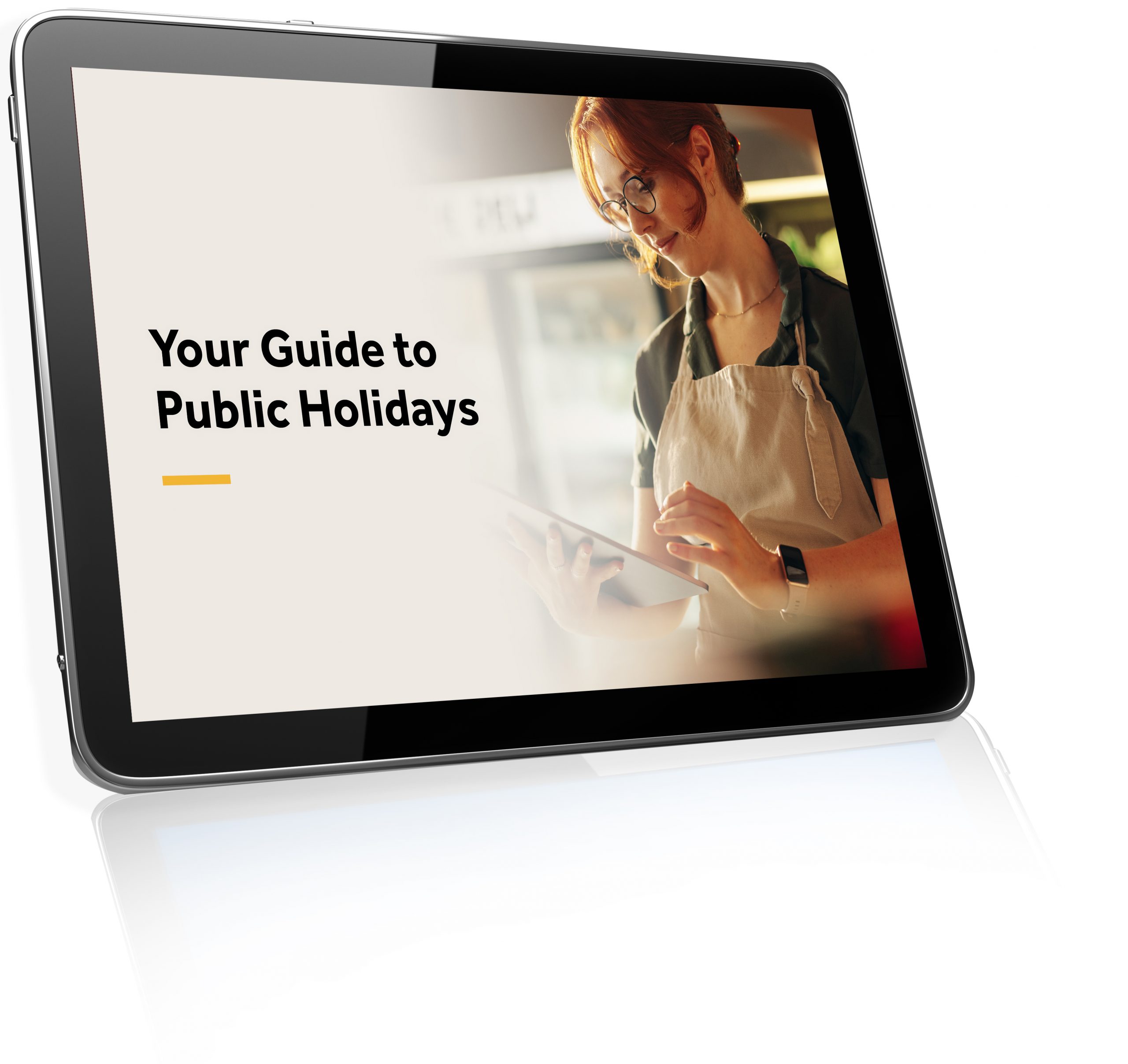
What are penal rates?
Penal rates are extra payments that employers pay to employees for working outside of their normal working hours, expressed as an additional percentage of the ordinary rate of pay. Penal rates are intended to compensate employees for working unsociable hours, such as on weekends, evenings, and public holidays. In New Zealand, penal rates are considered a form overtime pay.
What are shift penal rates?
Shift penal rates are penal rates that are paid to employees who work shifts. Shift penal rates are usually higher than standard penal rates, because shift workers frequently and repeatedly work unsociable hours. The additional pay is intended to compensate for any disruption this causes to their personal lives.
It’s easy to confuse standard penal rates with shift penal rates. To simplify things, here’s a breakdown of the key differences:
| Standard penal rates | Shift penal rates | |
| Definition | Additional payments for working on certain days or times | Additional payments for working shifts |
| Purpose | To compensate employees for the inconvenience of working outside of normal working hours | To compensate employees for the inconvenience of working shifts |
| Amount | Typically lower than shift penal rates | Typically higher than standard penal rates |
| Application | Typically applicable to work performed on weekends, public holidays, or outside of normal working hours | Typically applicable to all work performed by shift workers |
Do employers have to pay penal rates in New Zealand?
With the exception of public holiday penal rates, standard penal rates and shift penal rates are not explicitly required by law in New Zealand, but they are commonly included in employment agreements and collective agreements.
The Employment Relations Act 2000 (the Act) requires employers to pay employees at least the minimum wage, but it does not specify any requirements for penal rates. However, the Act does require employers to bargain in good faith with their employees to set pay and conditions, and this may include bargaining over penal rates.
If an employee’s employment agreement or collective agreement includes penal rates, then the employer is legally required to pay them. If an employee’s agreement does not include penal rates, then the employer is not legally required to pay them, but they may do so if they wish.
Who is entitled to penal rates?
All employees who have penal rates written into their employment agreement or collective agreement are entitled to penal rates whenever they work at a relevant time. However, there are some exceptions to this rule. For example, employees who work in certain industries, such as the hospitality industry, may not be entitled to penal rates if they are working less than a certain number of hours per week.
When do penal rates apply?
The most common times that penal rates apply are:
Evenings: Employees are paid for work performed outside of normal business hours, such as between 6pm and 10pm.
Nights: Employees are paid for work performed between 10pm and 6am.
Weekends: Employees are paid for work performed on Saturdays and Sundays.
Public holidays: Employees are paid for work performed on public holidays.
How much are penal rates?
The amount of penal rates varies depending on the industry, the employer, and the employee’s employer agreement or collective agreement. However, the following are some general guidelines:
Evening rates: Typically between 10% and 20% of the employee’s ordinary rate of pay.
Night rates: Typically between 20% and 50% of the employee’s ordinary rate of pay.
Weekend rates: Typically between 20% and 50% of the employee’s ordinary rate pay.
Public holiday rates: At least 50% of the employee’s ordinary rate of pay, but often more.
Collective bargaining agreements
Collective bargaining agreements (CBAs) are legally binding agreements that are negotiated between employers and unions on behalf of their members. CBAs typically cover a range of employment matters, including wages, hours of work, leave entitlements, and working conditions.
CBAs can override the minimum standards in the Employment Relations Act, including those relating to penal rates. This means that if a CBA includes penal rates that are higher than the minimum wage, the employer must pay the higher rates.
Public holiday penal rates
Public holidays are days that are officially designated as holidays by the New Zealand government. There are 11 public holidays in New Zealand each year:
New Year’s Day (1 January)
Day after New Year’s Day (2 January)
Waitangi Day (8 February)
Good Friday (2 April)
Easter Monday (5 April)
ANZAC Day (25 April)
King’s Birthday (The first Monday in June)
Matariki Day (28 June)
Labour Day (The fourth Monday in October)
Christmas Day (25 December)
Boxing Day (26 December)
* Note New Year’s Day and the Day after New Year’s Day are always observed on the actual day, even if they fall on a weekend. If they fall on a Saturday or Sunday, then the following Monday is a public holiday.
Public holiday penal rates are the law in New Zealand, as laid out in the Holidays Act 2003.
Public holiday penal rates in New Zealand are calculated as follows:
Employees must be paid at least time and a half for working on a public holiday. This is known as ‘the statutory minimum’.
The employee’s relevant daily pay is used to calculate the public holiday penal rate. This is the employee’s ordinary daily pay, or their average daily pay if applicable.
The public holiday penal rate is calculated by adding half of the employee’s relevant daily pay to their ordinary daily pay (unless a higher public holiday is laid out in their collective bargaining agreement).
How are shift penal rates calculated on public holidays?
The way that shift penal rates are calculated on public holidays depends on the employee’s employment agreement or CBA. However, there are some general rules that apply.
All employees are entitled to be paid at least time and a half (the statutory minimum) for working on a public holiday.
Secondly, many employment agreements will specify higher penal rates for working on public holidays. For example, an employment agreement might specify that employees are paid double-time for working on a public holiday.
If an employee’s employment agreement specifies a higher penal rate for working on a public holiday than the statutory minimum, then the employee is entitled to be paid the higher rate.
However, an employment agreement cannot specify a lower penal rate for working on a public holiday than the statutory minimum.

Do you understand your public holiday pay obligations?
Keeping track of public holiday pay for employees can be tricky. What do you do if a public holiday falls on a weekend? How do you calculate leave? Our FREE E-Guide breaks down the essentials for public holidays and gives business owners a survival guide.
Penal rate examples
Here are some examples of how penal rates might be calculated:
A nurse works a night shift from 10pm on Christmas Eve to 6am on Christmas Day. The nurse’s employment agreement specifies that they are paid double-time for working during evenings and night times.
The nurse would be entitled to be paid double-time for the entire shift, as the entire shift falls within penal rate hours.
A waiter works a day shift from 8am to 5pm on Boxing Day. The waiter’s employment agreement specifies that they are paid time and a half for working on public holidays.
The waiter would be entitled to be paid time and a half for the entire shift, as the entire shift falls on a public holiday.
A doorman works a shift from 6pm on New Year’s Day to 4am on the 2 January. The doorman’s employment agreement specifies that they are paid double-time for working on public holidays.
The doorman would be entitled to be paid double-time for the first six hours of their shift, as the first six hours fall on a public holiday. They would be paid their usual rate for the last four hours of their shift, as the last four hours fall on a normal workday.
Alternative holidays
In addition to being paid penal rates for working on a public holiday, employees are also entitled to take an alternative holiday (also known as time in lieu) if the public holiday falls on a day that they would normally work.
However, an employer can refuse to grant an alternative holiday if it would unreasonably disrupt their business.
How to calculate penal rates
To calculate penal rates, you need to know the employee’s base rate and the applicable penal rate. Once you have this information, you can simply multiply the two numbers together.
For example, if a waiter’s ordinary daily pay is $20 and they are working during a public holiday, then their public holiday penal rate would be $30 ($20 + $10). If the employee works for 8 hours on a public holiday, they would be paid $240 ($30/hour x 8 hours).
If a nurse works a night shift at a base rate of $20 per hour and the shift penal rate for night shifts is 30%, the employee would be paid $26 per hour. If the employee worked a 9-hour night shift, they would be paid $234 ($26/hour x 9 hours).
Shift penal rates are taxed as ordinary income. This means that they are taxed at the employee’s marginal tax rate.
The benefits for employers
Needless to say, paying penal rates increases the cost of wages for employers. However, the benefits of paying penal rates can often outweigh the costs.
Here are some specific examples of how paying penal rates can benefit employers in New Zealand:
Attract and retain staff: Penal rates can help employers to attract and retain staff, especially for jobs that require work on weekends, public holidays, or late at night. This is because penal rates make these jobs more financially attractive to employees.
Reduce staff turnover: Penal rates can help to reduce staff turnover by making employees feel more valued and appreciated. This is because penal rates show that employers are willing to pay a premium for employees’ time and effort.
Improve morale and productivity: Penal rates can help to improve morale and productivity by showing employees that their hard work is rewarded. This can lead to a more motivated and productive workforce.
Meet customer demand: Penal rates can help employers to meet customer demand by allowing them to operate outside of normal business hours. This can be particularly important in industries such as retail, hospitality, and tourism.
Compete with other businesses: Penal rates can help employers to compete with other businesses that offer similar jobs. This is because penal rates make employers’ job offerings more attractive to potential employees.
Dispute resolution
If you have a dispute with your employee about penal rates, you should first try to resolve the issue in consultation with the employee and your finance or HR department. If you are unable to resolve the issue, be aware that the employee may decide to contact the Employment Mediation Service or the Employment Relations Authority to escalate the dispute.
How can Employsure help?
If you’re unsure whether to pay an employee a penal rate, or how much the penal rate should be, you should check the employee’s employment agreement or collective bargaining agreement. To avoid disputes, it’s important to meet your pay obligations as an employer.
For free initial advice about wages, including penal rates, Kiwi business owners can contact Employsure’s Advice Line on 0800568012.



